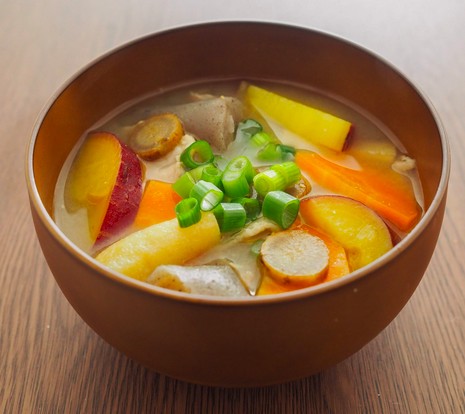In the Heian Period (794-1185 AD) miso was considered a precious medicine. By the 12th century, nutrient-dense miso became an important part of the samurai’s daily diet. But it wasn’t until the 17th century, that miso began to be made in the homes of ordinary folk.
From the start, though, miso was assumed to be a health-promoting food and several Japanese sayings tout the benefits of regularly consuming miso soup:
「みその医者殺し」miso no isha koroshi (literally miso murders doctors) is similar to the American saying, “An apple a day keeps the doctor away.”
「みそ汁は朝の毒消し」miso shiru wa asa no doku keshi(literally, miso is a morning after antidote). Miso is widely believed to be a remedy for hangover and indeed, this home-style wisdom probably has scientific merit since miso soup is a nutrient-rich way of providing hydration.
「みそ汁一杯三里の力」miso shiru ippai, san ri no chikara (literally, one bowl of miso soup, strength for 3 ri [a measure of distance equal to about 12 kilometers or 7.5 miles]). This adage claims the energy provided by a single bowl of miso soup is enough to sustain a person walking for 2 or more hours.
In addition to these kotowaza (proverbs) miso soup is credited for the long, disease-free life of several historical figures, chief among them, Tokugawa Ieyasu (1542-1616). Considering his high-risk profession (warrior-statesman in a volatile political environment) its amazing that he died of natural causes at such a ripe age. Ieyasu, the first of the Tokugawa Shoguns, is said to have enjoyed miso daily as a chowder made with「五菜三根」”five leafy and three root vegetables.”
Visit my KITCHEN CULTURE Blog to learn more about different kinds of MISO. Then visit PROJECT Miso Soup for inspiration and instruction on making miso soup in YOUR kitchen.
Stay connected.
I’m looking forward to your comments on the items I post to my Facebook page!
Follow me on Twitter!
I do hope you like it!
Elizabeth Andoh A Taste of Culture Culinary Arts Program Setagaya-ku, Tokyo 158-0095, Japan


Comments